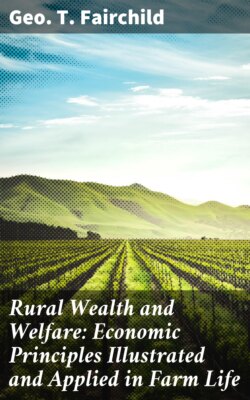Rural Wealth and Welfare: Economic Principles Illustrated and Applied in Farm Life

Реклама. ООО «ЛитРес», ИНН: 7719571260.
Оглавление
Geo. T. Fairchild. Rural Wealth and Welfare: Economic Principles Illustrated and Applied in Farm Life
Rural Wealth and Welfare: Economic Principles Illustrated and Applied in Farm Life
Table of Contents
Part I. Productive Industries: Analysis of Aims, Forces, Means and Methods
Chapter I. Aims Of Industry
Chapter II. Forces In Production Of Wealth
Chapter III. Labor Defined And Classified
Chapter IV. Capital Defined And Classified
Chapter V. Personal Attainments
Chapter VI. Combination Of Forces For Individual Efficiency
Chapter VII. Methods Of Association
Chapter VIII. Exchange: Advantages, Limitations And Tendencies
Chapter IX. Value The Basis Of Exchange
Chapter X. Exchange—Its Machinery
Chapter XI. Banks And Banking
Chapter XII. Deferred Settlement And Credit Expansion
Chapter XIII. Technical Division Of Labor
Chapter XIV. Aggregation Of Industry
Chapter XV. Special Incentives To Production
Chapter XVI. Business Security
Part II. Distribution of Wealth for Welfare
Chapter XVII. General Principles Of Fair Distribution
Chapter XVIII. Wages And Profits
Chapter XIX. Conflict Between Wage-Earners And Profit-Makers
Chapter XX. Proceeds Of Capital: Interest And Rent
Chapter XXI. Principles Of Interest
Chapter XXII. Principles Of Land Rent
Part III. Consumption of Wealth
Chapter XXIII. Wealth Used By Individuals
Chapter XXIV. Prudent Consumption
Chapter XXV. Imprudent Consumption
Chapter XXVI. Social Organization For Consumption
Chapter XXVII. Economic Functions Of Government
Chapter XXVIII. Economic Machinery Of Government
Conclusion
Index
Advertisements
Отрывок из книги
Geo. T. Fairchild
Published by Good Press, 2020
.....
Table of Contents
Accumulated energies.—The force accumulated through personal effort in training, education and discipline is similar to capital in the fact that it represents a period of time between the effort and its full accomplishment, and that it is devoted to production of wealth. It differs from capital in being immaterial human energy, exceedingly useful in combination with capital, but a part of the laborer, not his tools. It is gained by devoting time, attention, thought and practice to acquiring methods of greatest efficiency in any act of labor. It requires surplus energy in labor at any task to gain, not only the material result, but power to do the same task better and more easily next time. All the time expended in acquiring such powers is put into the value of what is finally produced. Any peculiar tact or ability developed becomes an essential part of individual powers, and its product, like that of any form of exertion, becomes the property of the individual.
.....